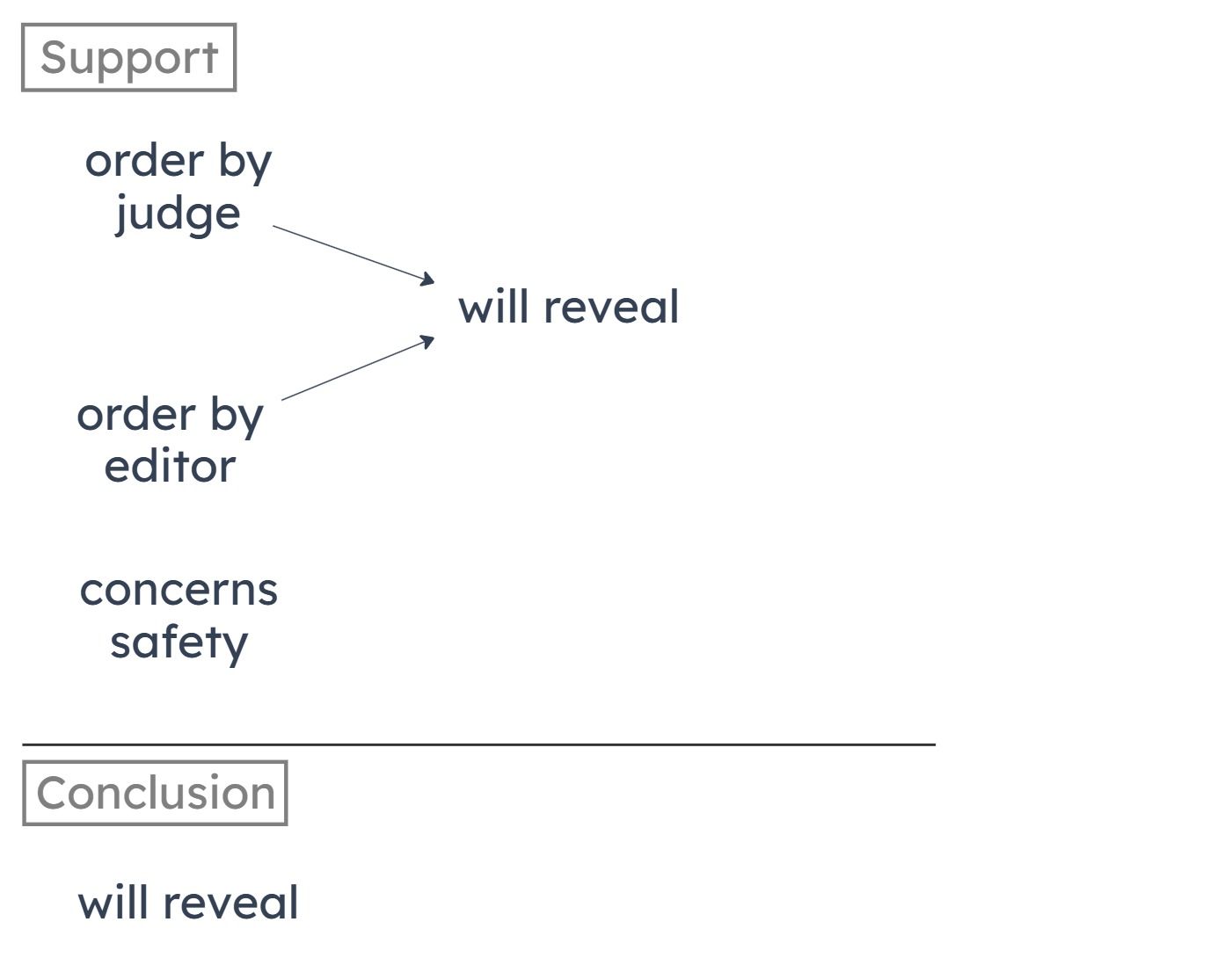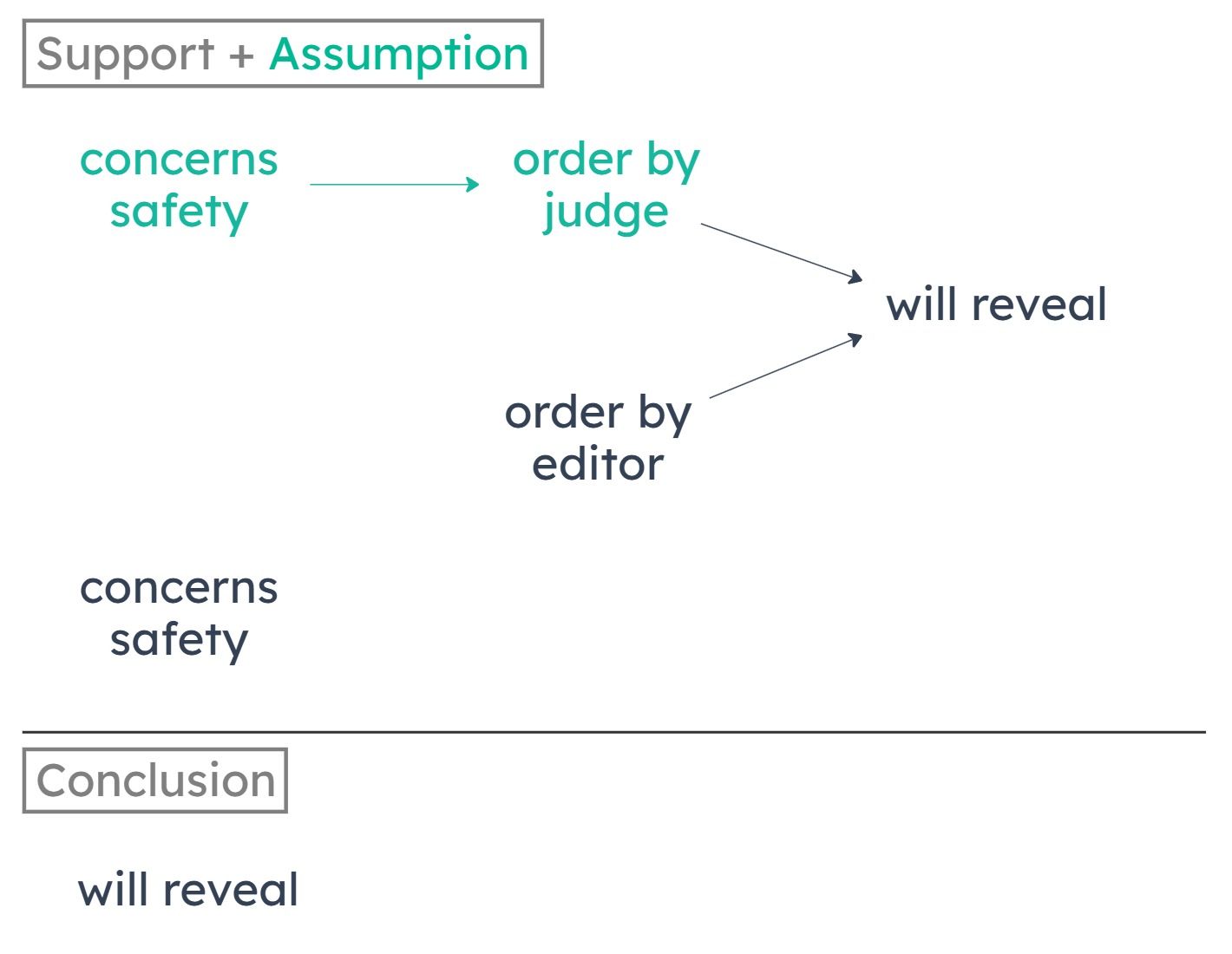LSAT 146 – Section 2 – Question 09
LSAT 146 - Section 2 - Question 09
June 2016You need a full course to see this video. Enroll now and get started in less than a minute.
Target time: 1:25
This is question data from the 7Sage LSAT Scorer. You can score your LSATs, track your results, and analyze your performance with pretty charts and vital statistics - all with a Free Account ← sign up in less than 10 seconds
| Question QuickView |
Type | Tags | Answer Choices |
Curve | Question Difficulty |
Psg/Game/S Difficulty |
Explanation |
|---|---|---|---|---|---|---|---|
| PT146 S2 Q09 |
+LR
+Exp
| Sufficient assumption +SA Conditional Reasoning +CondR Link Assumption +LinkA | A
1%
156
B
6%
156
C
88%
163
D
4%
155
E
1%
149
|
135 143 152 |
+Medium | 148.55 +SubsectionMedium |
Summary
The author concludes that the journalist will reveal the informant’s identity. This is based on the following:
If she is ordered to do so by a judge or by her editor, the journalist will publicly reveal the informant’s identity.
The information provided by the informant concerns safey violations at the power plant.
If she is ordered to do so by a judge or by her editor, the journalist will publicly reveal the informant’s identity.
The information provided by the informant concerns safey violations at the power plant.

Missing Connection
We know what is sufficient to infer that the journalist will publicly reveal the identity — a judge or her editor orders her to. Do we have enough to establish that a judge or her editor will order her to reveal the identity? No. But we do know that the information concerns safety violations. If we can get from the fact that the information concerns safety violations to the idea that a judge or her editor will order her to disclose, that would make the argument valid.
A
The information that the informant provided is known to be false.
(A) doesn’t establish that a judge or her editor will order disclosure. So it doesn’t trigger the premise concerning when the journalist will reveal the informant’s identity.
B
The journalist’s editor will not order her to reveal the informant’s identity unless the information is accurate and concerns public safety.
(B) tells us that if the information is not accurate or does not concern public safety, then the editor will NOT order disclosure. But we’re trying to prove that the judge or editor WILL order disclosure.
C
If the information concerns safety at the power plant, a judge will order the journalist to reveal her informant’s identity.
We know that the information concerns safety at the power plant. Based on (C), we can infer, then, that the judge will order disclosure of the identity. Based on the first premise, then, we can conclude that the journalist will reveal the informant’s identity.

D
The truth of the information provided by the informant can be verified only if the informant’s identity is publicly revealed.
(D) doesn’t establish that a judge or her editor will order disclosure. So it doesn’t trigger the premise concerning when the journalist will reveal the informant’s identity.
E
The informant understood, at the time the journalist promised him confidentiality, that she would break this promise if ordered to do so by a judge.
(E) doesn’t establish that a judge or her editor will order disclosure. So it doesn’t trigger the premise concerning when the journalist will reveal the informant’s identity.
Take PrepTest
Review Results
LSAT PrepTest 146 Explanations
Section 1 - Logical Reasoning
- Question 01
- Question 02
- Question 03
- Question 04
- Question 05
- Question 06
- Question 07
- Question 08
- Question 09
- Question 10
- Question 11
- Question 12
- Question 13
- Question 14
- Question 15
- Question 16
- Question 17
- Question 18
- Question 19
- Question 20
- Question 21
- Question 22
- Question 23
- Question 24
- Question 25
Section 2 - Logical Reasoning
- Question 01
- Question 02
- Question 03
- Question 04
- Question 05
- Question 06
- Question 07
- Question 08
- Question 09
- Question 10
- Question 11
- Question 12
- Question 13
- Question 14
- Question 15
- Question 16
- Question 17
- Question 18
- Question 19
- Question 20
- Question 21
- Question 22
- Question 23
- Question 24
- Question 25
- Question 26
Section 3 - Logical Reasoning
- Question 01
- Question 02
- Question 03
- Question 04
- Question 05
- Question 06
- Question 07
- Question 08
- Question 09
- Question 10
- Question 11
- Question 12
- Question 13
- Question 14
- Question 15
- Question 16
- Question 17
- Question 18
- Question 19
- Question 20
- Question 21
- Question 22
- Question 23
- Question 24
- Question 25
- Question 26
Leave a Reply
You must be logged in to post a comment. You can get a free account here.